The Papers of Angus C. Graham
In 2018, the Society acquired the Papers and Library of Angus C. Graham thanks to the generous donation by his family. It has been one of my aims to complete the cataloguing of his archival papers before I leave my position as archivist at the Society. I am pleased to announce that this week I fulfilled that aim and the catalogue for the Papers of Angus C. Graham is now available on Archives Hub. It is a large collection of material and I have been grateful to the original listing made by Professors Bernhard Fuehrer and Christoph Harbsmeier, Ms Liu Yangruxin, Mr Davide Latini, Mr Connor Judge and Ms Liang Zhu, before the material was deposited with the Society, particularly as regards the Chinese language papers. However there was a considerable amount of appraisal and arranging to do in order to catalogue the papers and make them accessible for future researchers. So I am very happy that I have managed to complete the job; not leaving it in a half-finished state for my successor.
Angus C. Graham was born in 1919, in Penarth, Wales, and was educated in Penarth and Shropshire before attending Corpus Christi College, Oxford, where he attained a BA in Theology in 1940. He served in the Royal Air Force during WWII, taking a Services Japanese course at the School of Oriental and African Studies (SOAS) in 1944-45 which led to him acting as a Japanese interpreter in Malaya and Thailand from 1945-46. Graham attained a BA Hons Chinese from SOAS in 1949 and became a Chinese translator attached to the Malayan police in Penang from 1949-1950.
Graham took up his first academic post in 1950 as a Lecturer in Classical Chinese at SOAS completing his PhD thesis in 1953. He became a Reader in 1966, Professor of Classical Chinese in 1971 and a Fellow of the British Academy in 1981. During this period he also was a Visiting Fellow of Hong Kong University (1954-55), Consulting editor of “Foundations of Language” (commencing 1964), a Visiting Professor at University of Michigan (1970) and a Fellow of the Society of Humanities, Cornell University (1972-73).
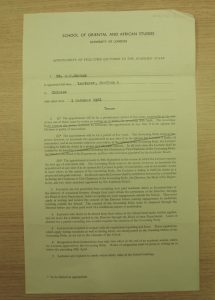
Graham’s research focused mainly around Chinese and western philosophy. He was concerned with the relations between philosophical concepts and the structure of the Chinese language. He published many books and articles connected to his research. He was also interested in poetry and short story writing and translation of early Chinese poetry.
Graham was appointed Emeritus Professor of Classical Chinese at SOAS in 1984. Post-retirement from SOAS he held a number of visiting appointments including at the Institute of East Asian Philosophies, Singapore, Faculty of Asian Studies, The Australian National University, Canberra, National Tsing Hua University, Taiwan, Brown University, Rhode Island, and the Department of Philosophy, University of Hawaii at Manoa.
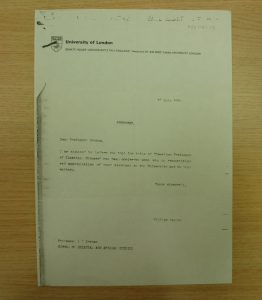
Graham died on 26 March 1991.
Graham was a prolific writer of both books and articles which is reflected in the archival papers. There are series for each of his publications on philosophy and Chinese studies, and a very large series concerning the many articles that he wrote, with another for his reviews of others’ work. He also wrote and translated poetry, as was mentioned in a previous blog post, as well as writing short stories. The papers concerned with these activities form another two series. In all there are 26 series in the catalogue:
- ACG/1 – Two Chinese Philosophers: Ch’eng Ming-tao and Ch’eng Yi-ch’uan
- ACG/2 – The Book of Lieh-tzu
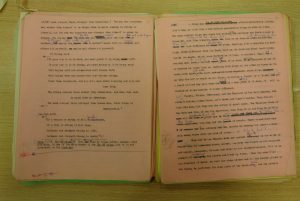
- ACG/3 – The Problem of Value
- ACG/4 – Poems of the Late T’ang
- ACG/5 – Later Mohist Logic, Ethics and Science
- ACG/6 – Chuang-tzŭ: The Seven “Inner Chapters” and Other Writings from the Book Chuang-tzŭ
- ACG/7 – Chuang-tzŭ: Textual Notes to a Partial Translation
- ACG/8 – Reason and Spontaneity
- ACG/9 – Studies in Early Chinese Philosophy and Philosophical Literature
- ACG/10 – Disputers of the Tao: Philosophical Argument in Ancient China
- ACG/11 – Poems of the West Lake
- ACG/12 – Unreason within Reason: Essays on the Outskirts of Rationality
- ACG/13 – Articles
- ACG/14 – Reviews
- ACG/15 – Poetry and Translations
- ACG/16 – Stories
- ACG/17 – Notes
- ACG/18 – Appointments
- ACG/19 – Conferences
- ACG/20 – Correspondence
- ACG/21 – Interviews
- ACG/22 – Diaries
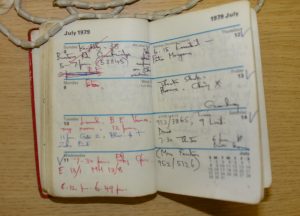
- ACG/23 – Photograph
- ACG/24 – Others’ Publications
- ACG/25 – Others’ Appointments
- ACG/26 – Chinese reference material
The smallest series is that of Photograph which contains a single item – the only photograph that we have of Graham in the collection: a colour photograph of Angus Graham. On the reverse has been added the note “To see a world in a grain of sand…”
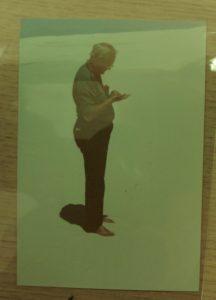
It has been both interesting and challenging to work with these papers. And it is hoped that now they are available for researchers to use, they will stimulate research and debate on Chinese studies throughout the modern and postmodern eras, contrasting why and how researchers in different time periods have engaged with China and Chinese studies. We are fortunate within our Collections to have the Papers of Thomas Manning, one of the earliest Englishmen to want to study China and its philosophy and culture. The Papers of Angus C. Graham, we hope, will work in parallel with those of Manning to contribute to further research.
~ ~ ~ ~ ~
On the 26th August the Society held a virtual launch for Diana Darke’s new book entitled ‘Stealing from the Saracens’ which traces how architectural ideas and styles found in the buildings of Cairo, Damascus and Baghdad made their way through Islamic Spain, Venice and Sicily into Europe. The book explores the artistic interaction between East and West and how this is manifested in many important European monuments including the architectural designs for St. Paul’s cathedral by Sir Christopher Wren.
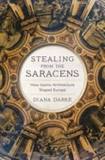
The lecture was well attended and graced by the presence of fellows from Cairo, Delhi, and Beijing to name but a few. This has made us realise that one of the good things to come out of this pandemic is that we have been forced to pursue virtual lectures and presentations allowing participation of members from the far flung corners of the earth giving a new and vibrant dynamic to the membership of the Society and the meaning of ‘a global RAS’. We are also particularly grateful to our sister societies in Shanghai, Beijing and Seoul for sharing their virtual events with us as well which have also attracted an enthusiastic following.
